Related Research Articles

Toilet paper is a tissue paper product primarily used to clean the anus and surrounding region of feces, and to clean the external genitalia and perineal area of urine.
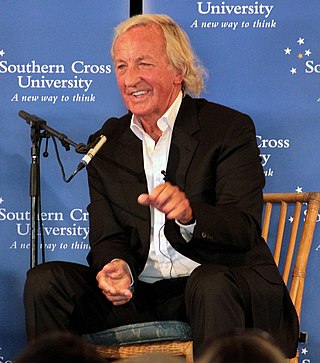
John Richard Pilger is an Australian journalist, writer, scholar, and documentary filmmaker. He has mainly been based in Britain since 1962. He has also been a visiting professor at Cornell University in New York.

A bidet is a bowl or receptacle designed to be sat upon in order to wash one's genitalia, perineum, inner buttocks, and anus. The modern variety has a plumbed-in water supply and a drainage opening, and is thus a plumbing fixture subject to local hygiene regulations. The bidet is designed to promote personal hygiene and is used after defecation, and before and after sexual intercourse. It can also be used to wash feet, with or without filling it up with water. In several European countries, a bidet is now required by law to be present in every bathroom containing a toilet bowl. It was originally located in the bedroom, near the chamber-pot and the marital bed, but in modern times is located near the toilet bowl in the bathroom. Fixtures that combine a toilet seat with a washing facility include the electronic bidet.
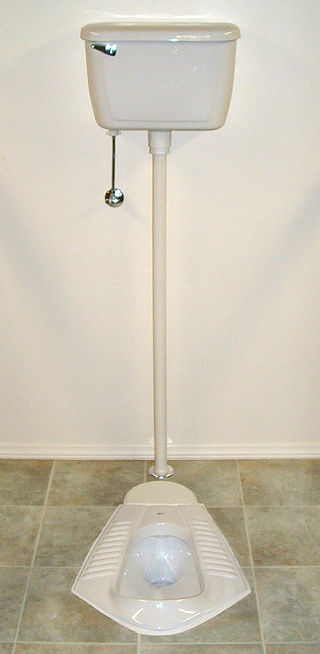
A squat toilet is a toilet used by squatting, rather than sitting. This means that the posture for defecation and for female urination is to place one foot on each side of the toilet drain or hole and to squat over it. There are several types of squat toilets, but they all consist essentially of a toilet pan or bowl at floor level. Such a toilet pan is also called a "squatting pan". A squat toilet may use a water seal and therefore be a flush toilet, or it can be without a water seal and therefore be a dry toilet. The term "squat" refers only to the expected defecation posture and not any other aspects of toilet technology, such as whether it is water flushed or not.
Green Left, previously known as Green Left Weekly, is an Australian socialist newspaper, written by activists to "present the views excluded by the big business media". The newspaper was founded in 1990. Green Left is the de facto newspaper of the Socialist Alliance.

A toilet-roll holder, also known as a toilet paper dispenser, is an item that holds a roll of toilet paper. Common models include a hinged length of wire mounted horizontally on a wall, a thicker axle either recessed into a wall or mounted on a frame, or a freestanding vertical pole on a base. In recent years, automatic toilet paper dispensers which automatically fold and cut the toilet paper are being installed in public toilets.
A pay toilet is a public toilet that requires the user to pay. It may be street furniture or be inside a building, e.g. a shopping mall, department store, or railway station. The reason for charging money is usually for the maintenance of the equipment. Paying to use a toilet can be traced back almost 2000 years, to the first century BCE. The charge is often collected by an attendant or by inserting coins into an automatic turnstile; in some freestanding toilets in the street, the fee is inserted into a slot by the door. Mechanical coin operated locks are also used. Some more high tech toilets accept card or contactless payments. Sometimes, a token can be used to enter a pay toilet without paying the charge. Some municipalities offer these tokens to residents with disabilities so these groups aren't discriminated against by the pay toilet. Some establishments such as cafés and restaurants offer tokens to their customers so they can use the toilets for free but other users must pay the relevant charge.
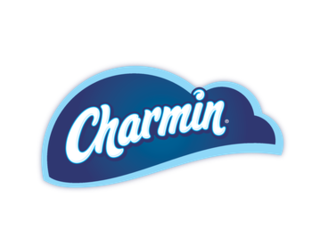
Charmin is an American brand of toilet paper manufactured by Procter & Gamble.

Tissue paper or simply tissue is a lightweight paper or, light crêpe paper. Tissue can be made from recycled paper pulp on a paper machine.

Panic buying occurs when consumers buy unusually large amounts of a product in anticipation of, or after, a disaster or perceived disaster, or in anticipation of a large price increase, or shortage.
The News on Sunday was a left-wing British tabloid newspaper. It was launched in April 1987. Publication ceased seven months later, in November 1987.
Pilger is a village in the Canadian province of Saskatchewan within the Rural Municipality of Three Lakes No. 400 and Census Division No. 15. It is approximately 100 km (62 mi) northeast of the City of Saskatoon. The village offers a bar and restaurant, the Pilger Public Library, an autobody shop, and Pilger General Store offering groceries, fuel and more.
"The Stall" is the 76th episode of the NBC sitcom Seinfeld. It is the 12th episode of the fifth season, and first aired on January 6, 1994. In this episode, Jerry tries to keep Elaine from finding out that his girlfriend Jane is the same woman she had a bathroom altercation with over a lack of toilet paper, while Kramer suspects Jane is a worker on a phone sex line.
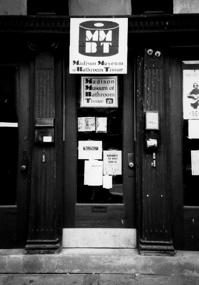
The Madison Museum of Bathroom Tissue was established in 1992 and closed in 2000. The museum was founded by Carol Kolb in Madison, Wisconsin in a second-floor apartment, three blocks from the Wisconsin State Capitol.

A female urination device (FUD), personal urination device (PUD), female urination aid, or stand-to-pee device (STP) is a device that can be used to more precisely aim the stream of urine while urinating standing upright. Variations range from basic disposable funnels to more elaborate reusable designs. Personal urination devices have increased in popularity since the 1990s. They are used for outdoor occupations & recreation, gender affirmation/safety, and medical reasons.
Anal hygiene or anal cleansing refers to the practices that are performed on a person's anus to maintain hygiene, usually in the aftermath of defecation. Post-defecation cleansing is rarely discussed academically, partly due to the social taboo surrounding it. The scientific objective of post-defecation cleansing is to prevent exposure to pathogens. The process of post-defecation cleansing involves either washing the anus and inner part of the buttocks with water or wiping the area with dry materials such as toilet paper. Water-based cleansing typically involves either the use of running water from a handheld vessel and a hand for washing or the use of pressurized water through a jet device, such as a bidet. In either method, subsequent hand sanitization is essential to achieve the ultimate objectives of post-defecation cleansing.

An aircraft lavatory or plane toilet is a small room on an aircraft with a toilet and sink. They are commonplace on passenger flights except some short-haul flights. Aircraft toilets were historically chemical toilets, but many now use a vacuum flush system instead.
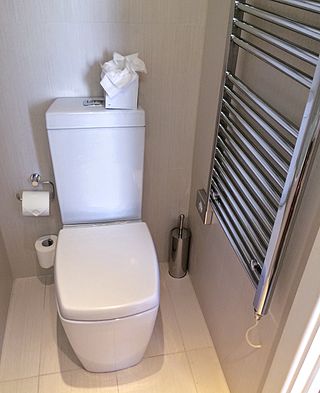
A toilet is a piece of sanitary hardware that collects human urine and feces, and sometimes toilet paper, usually for disposal. Flush toilets use water, while dry or non-flush toilets do not. They can be designed for a sitting position popular in Europe and North America with a toilet seat, with additional considerations for those with disabilities, or for a squatting posture more popular in Asia, known as a squat toilet. In urban areas, flush toilets are usually connected to a sewer system; in isolated areas, to a septic tank. The waste is known as blackwater and the combined effluent, including other sources, is sewage. Dry toilets are connected to a pit, removable container, composting chamber, or other storage and treatment device, including urine diversion with a urine-diverting toilet.

The Committee to End Pay Toilets in America, or CEPTIA, was a 1970s grass-roots political organization which was one of the main forces behind the elimination of pay toilets in many American cities and states.

Some toilet roll holders or dispensers allow the toilet paper to hang in front of (over) or behind (under) the roll when it is placed parallel to the wall. This divides opinions about which orientation is better. Arguments range from aesthetics, hospitality, ease of access, and cleanliness, to paper conservation, ease of detaching sheets, and compatibility with pets.
References
- 1 2 Morgan, Ted (1976-01-25). "New! Improved!". New York Times. p. 284.
- ↑ John Pilger, (1976) Street of Joy (television program), UK: ATV Colour Production, currently available online, 4:00-6:00.
- ↑ Pilger (1976), 6:00-7:00.
- ↑ "About Patent Developer" . Retrieved 2023-12-21.